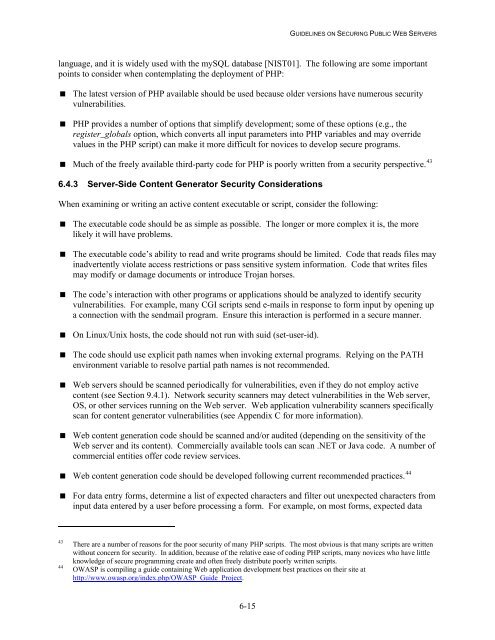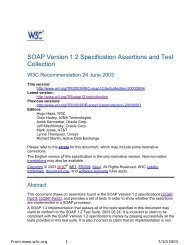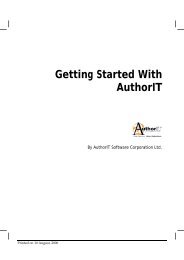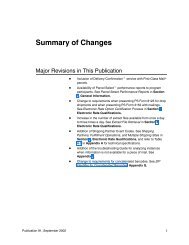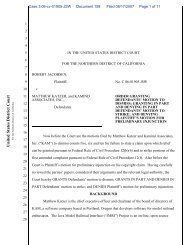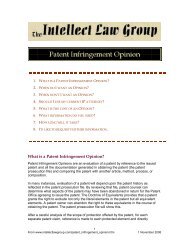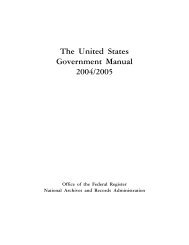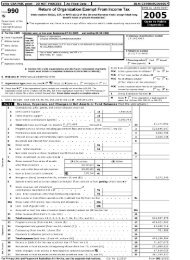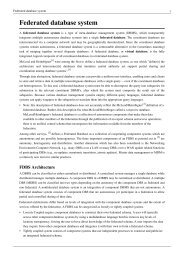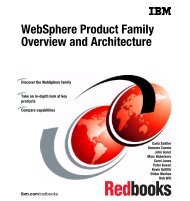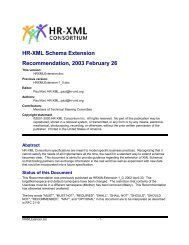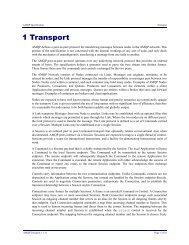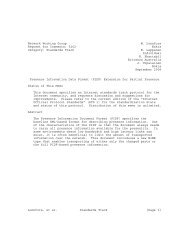NIST 800-44 Version 2 Guidelines on Securing Public Web Servers
NIST 800-44 Version 2 Guidelines on Securing Public Web Servers
NIST 800-44 Version 2 Guidelines on Securing Public Web Servers
You also want an ePaper? Increase the reach of your titles
YUMPU automatically turns print PDFs into web optimized ePapers that Google loves.
GUIDELINES ON SECURING PUBLIC WEB SERVERS<br />
language, and it is widely used with the mySQL database [<str<strong>on</strong>g>NIST</str<strong>on</strong>g>01]. The following are some important<br />
points to c<strong>on</strong>sider when c<strong>on</strong>templating the deployment of PHP:<br />
The latest versi<strong>on</strong> of PHP available should be used because older versi<strong>on</strong>s have numerous security<br />
vulnerabilities.<br />
PHP provides a number of opti<strong>on</strong>s that simplify development; some of these opti<strong>on</strong>s (e.g., the<br />
register_globals opti<strong>on</strong>, which c<strong>on</strong>verts all input parameters into PHP variables and may override<br />
values in the PHP script) can make it more difficult for novices to develop secure programs.<br />
Much of the freely available third-party code for PHP is poorly written from a security perspective. 43<br />
6.4.3 Server-Side C<strong>on</strong>tent Generator Security C<strong>on</strong>siderati<strong>on</strong>s<br />
When examining or writing an active c<strong>on</strong>tent executable or script, c<strong>on</strong>sider the following:<br />
The executable code should be as simple as possible. The l<strong>on</strong>ger or more complex it is, the more<br />
likely it will have problems.<br />
The executable code’s ability to read and write programs should be limited. Code that reads files may<br />
inadvertently violate access restricti<strong>on</strong>s or pass sensitive system informati<strong>on</strong>. Code that writes files<br />
may modify or damage documents or introduce Trojan horses.<br />
The code’s interacti<strong>on</strong> with other programs or applicati<strong>on</strong>s should be analyzed to identify security<br />
vulnerabilities. For example, many CGI scripts send e-mails in resp<strong>on</strong>se to form input by opening up<br />
a c<strong>on</strong>necti<strong>on</strong> with the sendmail program. Ensure this interacti<strong>on</strong> is performed in a secure manner.<br />
On Linux/Unix hosts, the code should not run with suid (set-user-id).<br />
The code should use explicit path names when invoking external programs. Relying <strong>on</strong> the PATH<br />
envir<strong>on</strong>ment variable to resolve partial path names is not recommended.<br />
<strong>Web</strong> servers should be scanned periodically for vulnerabilities, even if they do not employ active<br />
c<strong>on</strong>tent (see Secti<strong>on</strong> 9.4.1). Network security scanners may detect vulnerabilities in the <strong>Web</strong> server,<br />
OS, or other services running <strong>on</strong> the <strong>Web</strong> server. <strong>Web</strong> applicati<strong>on</strong> vulnerability scanners specifically<br />
scan for c<strong>on</strong>tent generator vulnerabilities (see Appendix C for more informati<strong>on</strong>).<br />
<strong>Web</strong> c<strong>on</strong>tent generati<strong>on</strong> code should be scanned and/or audited (depending <strong>on</strong> the sensitivity of the<br />
<strong>Web</strong> server and its c<strong>on</strong>tent). Commercially available tools can scan .NET or Java code. A number of<br />
commercial entities offer code review services.<br />
<strong>Web</strong> c<strong>on</strong>tent generati<strong>on</strong> code should be developed following current recommended practices. <str<strong>on</strong>g>44</str<strong>on</strong>g><br />
For data entry forms, determine a list of expected characters and filter out unexpected characters from<br />
input data entered by a user before processing a form. For example, <strong>on</strong> most forms, expected data<br />
43<br />
<str<strong>on</strong>g>44</str<strong>on</strong>g><br />
There are a number of reas<strong>on</strong>s for the poor security of many PHP scripts. The most obvious is that many scripts are written<br />
without c<strong>on</strong>cern for security. In additi<strong>on</strong>, because of the relative ease of coding PHP scripts, many novices who have little<br />
knowledge of secure programming create and often freely distribute poorly written scripts.<br />
OWASP is compiling a guide c<strong>on</strong>taining <strong>Web</strong> applicati<strong>on</strong> development best practices <strong>on</strong> their site at<br />
http://www.owasp.org/index.php/OWASP_Guide_Project.<br />
6-15


